Key takeaways:
- Audio news aggregators enhance information consumption by providing curated, concise content and emotional resonance, particularly on critical topics like the refugee crisis.
- The refugee crisis encompasses not only the struggle for safety but also the psychological trauma and legal barriers faced by displaced individuals.
- Staying informed effectively involves engaging with diverse and dedicated audio news platforms, allowing for deeper empathy and understanding of complex issues.
- Innovative integration programs from humanitarian organizations are crucial for helping refugees adapt and contribute to their new communities.
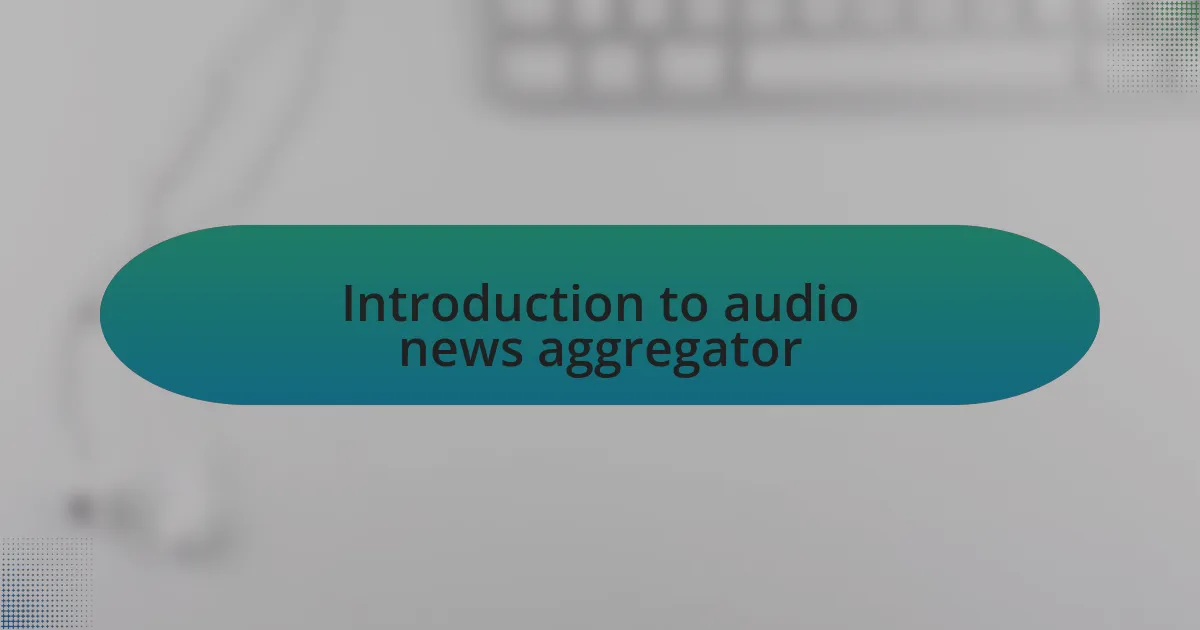
Introduction to audio news aggregator
Audio news aggregators have transformed the way we consume information. I remember the first time I used one; it was like having a personal news curator at my fingertips. Suddenly, I could listen to headlines, in-depth reports, and podcasts all while multitasking, which made staying informed more accessible than ever.
These platforms bring together diverse news sources, allowing a myriad of perspectives on current events, including crucial topics like the refugee crisis. Have you ever felt overwhelmed by the abundance of information out there? I certainly have. An audio news aggregator can help cut through the noise, offering concise and curated content that keeps you updated without drowning you in details.
Moreover, the emotional resonance of stories becomes even more impactful when we listen. I recall a heart-wrenching segment about refugees escaping conflict zones; hearing personal testimonies makes the situation more real and urgent. It’s not just news; it’s a way to connect with the human experience behind the headlines.
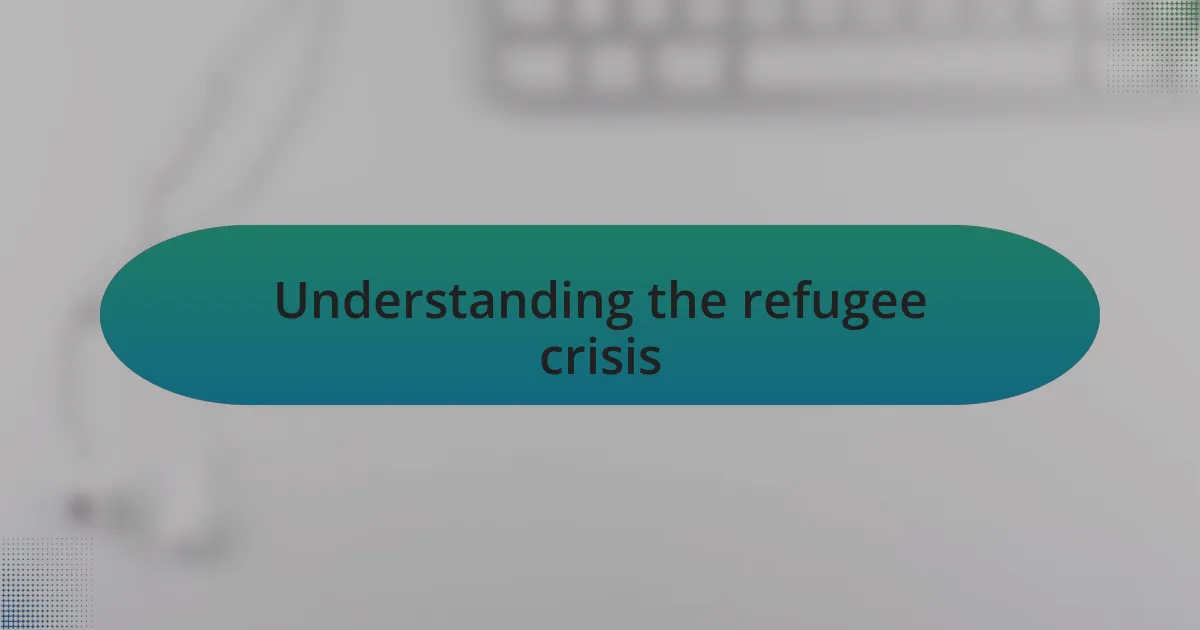
Understanding the refugee crisis
Understanding the refugee crisis requires a deeper look into the factors driving people from their homes. It’s not just about seeking safety; it often involves fleeing unimaginable horrors, like war or persecution. I still vividly remember listening to a podcast featuring a Syrian refugee who described how his family had to leave everything behind—not just possessions, but their entire lives.
As I absorbed those stories, I couldn’t help but feel a mix of compassion and frustration. Why is it that millions are displaced while others remain indifferent? It’s easy to overlook the reality that many refugees face overwhelming uncertainty and trauma, battling not only physical dangers but the psychological scars that come with such upheaval. For instance, I heard a heart-wrenching narrative about a mother who lost her child during the perilous journey to safety, and it made me realize the immense strength found in vulnerability.
The challenges refugees encounter extend beyond just survival; they often grapple with a complex web of legal and social barriers in their new environments. I remember contemplating my own privilege while reflecting on the struggles of those adapting to alien cultures and languages. It raises an essential question for us all: How can we better support these individuals in their journeys toward rebuilding their lives? Addressing the refugee crisis is not just a political issue; it’s a profoundly human one that calls for empathy and action.
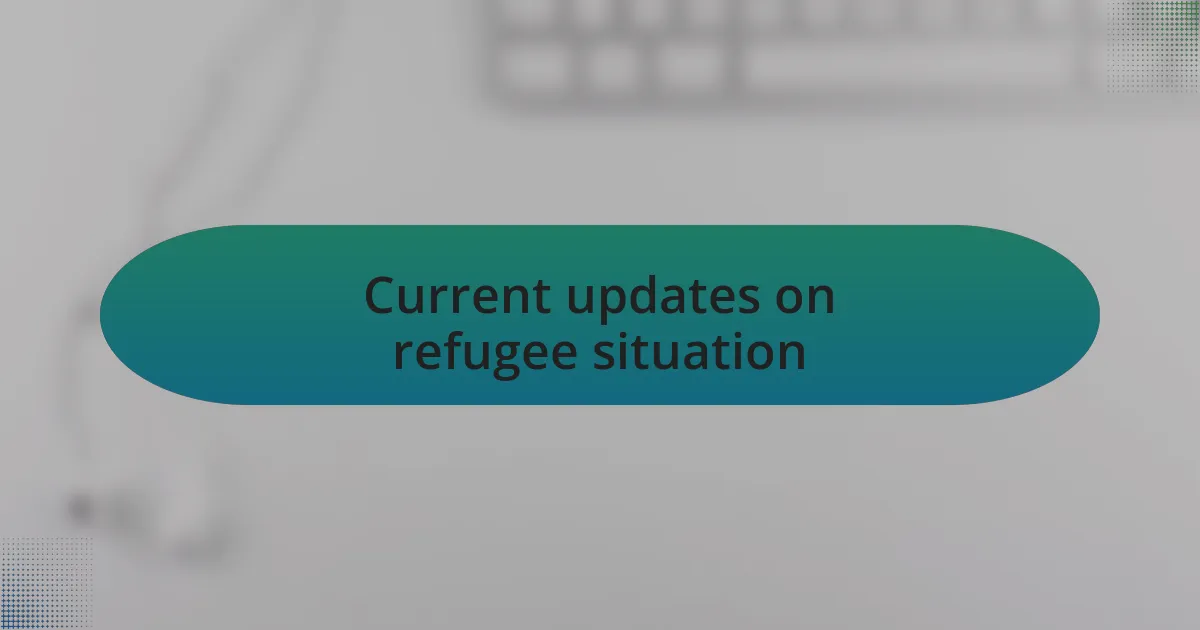
Current updates on refugee situation
The current situation of refugees around the world remains dire, with millions still displaced as new conflicts emerge. Recently, I came across a report detailing how the ongoing violence in regions like Afghanistan continues to force families to flee their homes. It makes me wonder how many more stories of resilience and heartbreak we haven’t yet heard.
In Europe, the summer of 2023 saw a notable increase in the arrival of refugees from North Africa, leading to renewed discussions about asylum policies. I can only imagine the mixed emotions of individuals arriving on foreign shores, hoping for safety but met with complex bureaucracy. It’s a reminder of how crucial it is for governments to balance security concerns with compassion for those seeking refuge.
Additionally, humanitarian organizations have started innovative programs focused on integration, which I believe is a step in the right direction. For example, programs offering language classes and job training can dramatically improve refugee lives, enabling them to contribute to their new communities. Yet, I can’t help but ask: are we doing enough to ensure that these individuals feel welcomed and valued, or are we merely ticking boxes in response to an ongoing crisis?
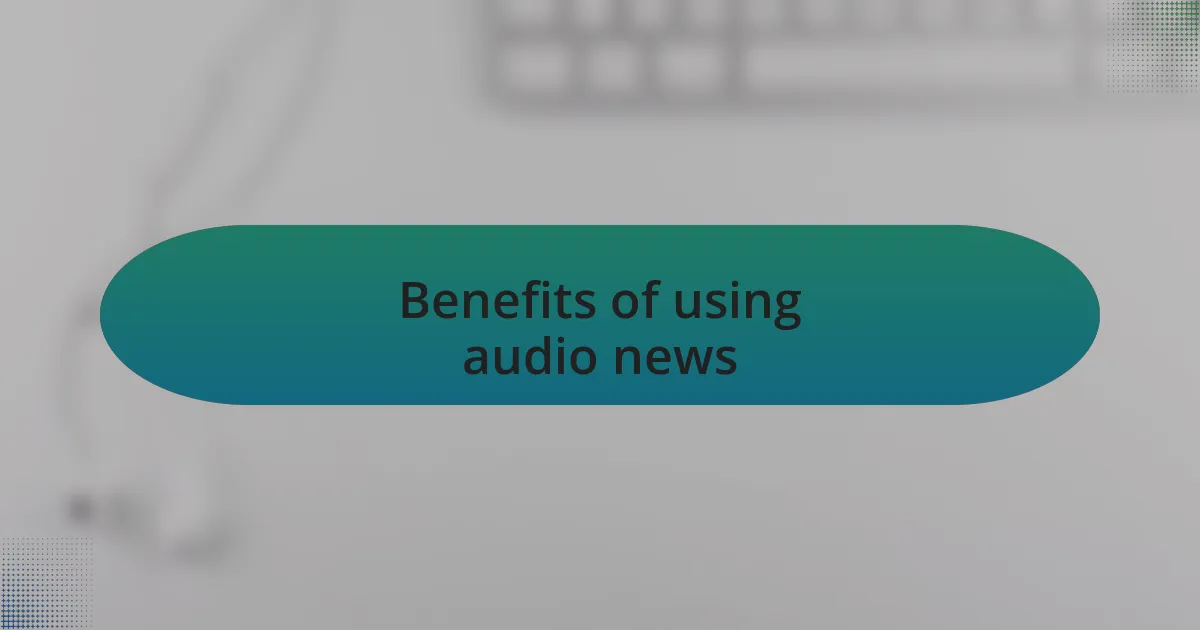
Benefits of using audio news
Accessing news through audio formats offers a unique convenience that I truly appreciate. It allows me to stay updated while multitasking, whether I’m cooking dinner or on my daily commute. There’s something about listening to stories and updates that feels more personal and impactful than just reading text.
The human voice brings a level of emotion and depth that often gets lost in print. I remember tuning into a podcast that featured firsthand accounts from refugees; the raw emotion in their voices shifted my perspective in a way that simply reading the same information could not. It’s these intimate insights that foster a deeper understanding and connection to issues that might feel distant.
Moreover, audio news caters to a diverse audience. Those with visual impairments or reading difficulties can engage with the content seamlessly. This inclusivity is essential as it ensures that vital stories, like the ongoing refugee crisis, reach a broader spectrum of listeners, enabling everyone to feel informed and empowered to make a difference. How powerful it is to think that by simply listening, we can become part of the solution!
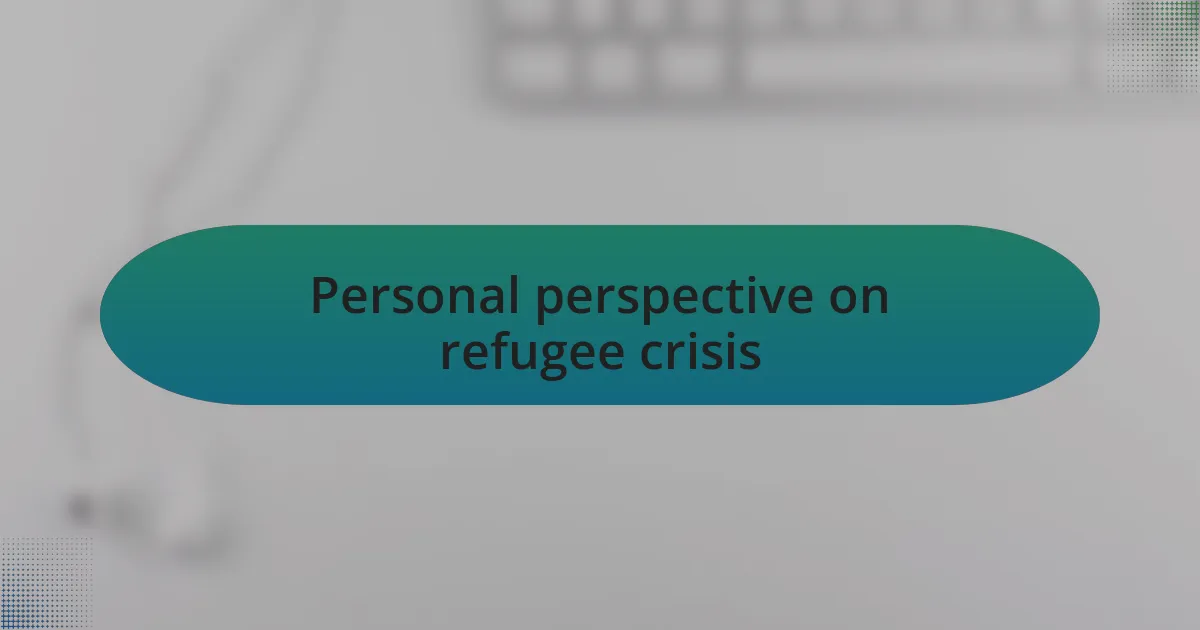
Personal perspective on refugee crisis
When I think about the refugee crisis, it often feels overwhelming, doesn’t it? I recall a time when I met a family who had fled their home due to violence. Hearing their story firsthand changed how I saw the statistics; they became human and relatable rather than just numbers on a screen.
Listening to their experiences through an audio platform was particularly moving for me. The way they spoke about their hopes, fears, and dreams brought their struggles alive in a way that text could never achieve. It struck me how important it is to share these narratives; they bridge the vast gap between those of us who haven’t faced such hardships and those who have.
Sometimes, I wonder how many lives can be transformed by simply sharing these stories. Every account—whether it’s about escaping war or striving for a better future—offers a glimpse into resilience and courage that inspires empathy. Engaging with audio stories reminds me of our common humanity and the collective responsibility we bear to support those in need.
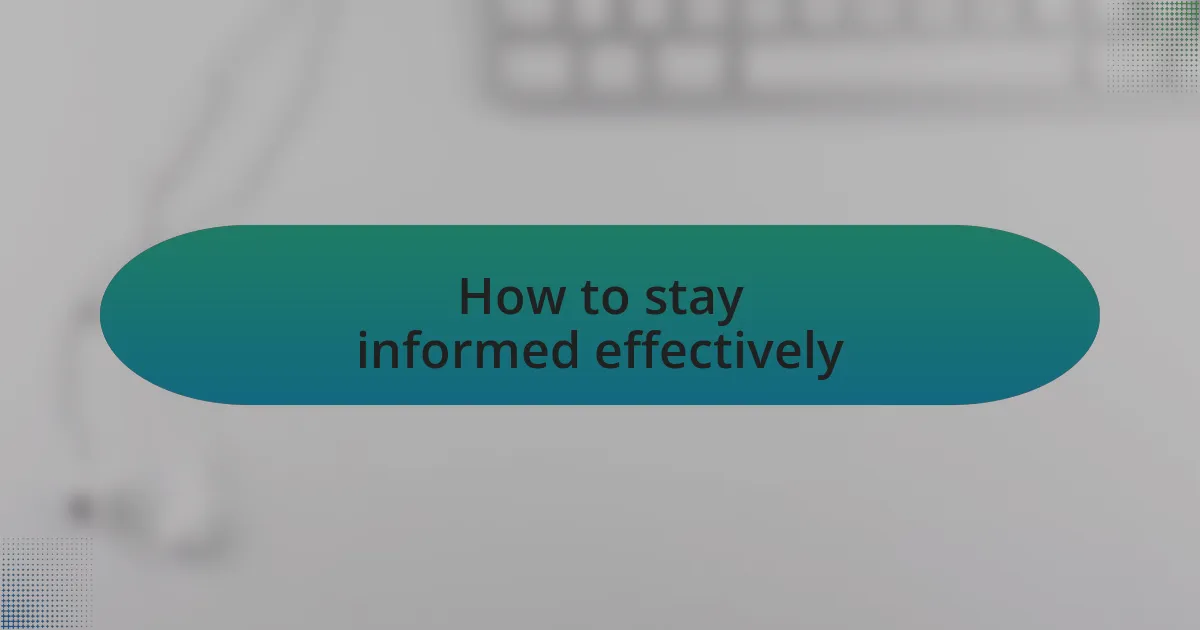
How to stay informed effectively
Staying informed about complex issues like the refugee crisis requires more than just skimming headlines. I find that following dedicated audio news platforms, which often provide in-depth interviews and personal stories, makes the experience more immersive. Have you ever tuned into a podcast that changed your perspective? I remember listening to one where a refugee shared how they managed to adapt to a new life; it made the crisis more tangible for me.
I also prioritize diverse sources to ensure a well-rounded understanding of the situation. By exploring international broadcasts and grassroots reports, I gain insights that conventional news may overlook. This multifaceted approach not only broadens my knowledge but also deepens my empathy for those affected by the crisis.
Lastly, engaging with communities on social media can be incredibly enlightening. I often follow organizations that focus on refugee support, where I can hear real-time updates and interact with individuals who share their experiences. Isn’t it fascinating how a simple comment can lead to deeper conversations? This direct line to those on the front lines of the crisis enriches my perspective and keeps me informed in a much more personal way.